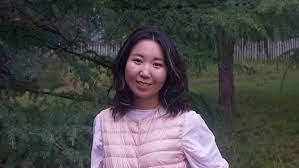
What prompted your interest in the environment?
I did my bachelor’s degree in chemistry concentrating on water quality after witnessing a filthily muddy river that was polluted from illegal “ninja” mining close to my grandparents’ place, who were nomadic herders. I was 15 and did not know much about environmental impacts back then, but thinking about using that not-fresh-looking river water for domestic consumption was something that really concerned me. Protecting the environment and preserving freshwater sources have become one of my passions since then.
How did you get involved in international environmental advocacy?
Following my passion for water, I joined Water Youth Network in 2020 where I was exposed to many international projects that young people are working on and advocating about. Since then, I have realized that it’s important to deliver a youth voice and share youth perspectives internationally, as we are exposed to ground-level risks and can see opportunities for change. I have also learned a lot from a summer school program organized in 2022 by the Global Water Partnership Central and Eastern Europe group about water governance.
https://www.thegef.org/newsroom/feature-stories/spreading-word-about-ste...
News about the upcoming GEF Assembly: https://www.thegef.org/events/seventh-gef-assembly
Can you describe a project that is meaningful to you?
Segregating waste is not common practice in Mongolia, and this can lead to many challenges, particularly with regard to the disposal of medicines. Since different types of medicines are composed of a variety of chemical elements, they can end up causing soil and groundwater pollution when they are disposed with other trash. This can have an impact on human health, on animals and livestock, and on the hydrological cycle.
In 2019, I started a waste segregation micro-project in Mongolia focused on collecting unwanted medicines in order to lessen environmental pollution from their disposal. Since then, our youth-led volunteer project has expanded day by day, and we are now working with different pharmacies across the country to collect unused, expired, and unwanted medicinal waste from households to dispose it safely. We have now collected more than 2,700 kg of medicinal waste and the collection points have increased to a total of 25 pharmacies (22 in Ulaanbaatar and three in other provinces).
Accepting medicinal waste free of charge has encouraged people to see the importance of segregating waste and recognize how small changes of habit can bring positive changes and prevent risks from the contamination of chemicals in the environment.
If you could say one thing to today’s political and business leaders, what would it be?
Please look beyond your surrounding area and start acting now for sustainable development. It’s easier to start doing this right away than trying reverse course when it’s too late.
What are you looking forward to at the GEF Assembly?
I am so glad that GEF Assembly is supporting the inclusion of youth and civil society organization representatives, and encouraging our work. I am looking forward to witnessing and learning about actionable plans and decisions for conserving ecosystems, reducing toxic chemicals, and supporting vulnerable communities.










Add new comment